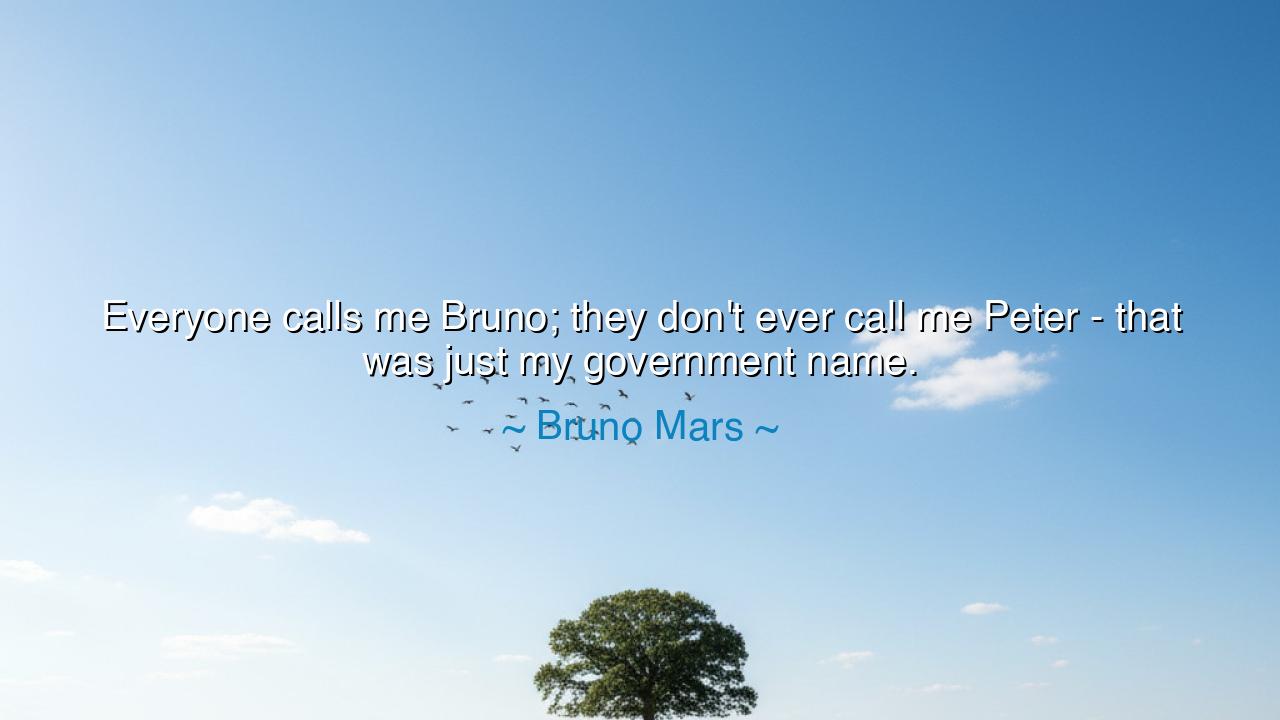
Everyone calls me Bruno; they don't ever call me Peter - that was
Everyone calls me Bruno; they don't ever call me Peter - that was just my government name.






"Everyone calls me Bruno; they don't ever call me Peter — that was just my government name." — Bruno Mars
In this playful yet profound declaration, Bruno Mars — born Peter Gene Hernandez — reveals a truth far deeper than a jest about names. Beneath the laughter lies a meditation on identity, the eternal struggle between who we are born as and who we become. When he says that “Peter” is his government name, he speaks of the identity assigned to him by society, the one written on papers and records — official, rigid, and external. But “Bruno,” the name he chose, is the identity born of his spirit, his passion, his art. In those few words, he expresses a truth known to sages and poets alike: that the true self is not always the one the world gives us, but the one we create through purpose and authenticity.
The ancients would have understood him well. For names have always been sacred — not merely words, but vessels of destiny. The Greeks spoke of the daemon, the divine spark that gives shape to a person’s nature. The Hebrews told of God renaming Abram to Abraham, Jacob to Israel, when their destinies changed. So too does Bruno, by naming himself anew, claim the power of rebirth — the right to define himself not by bureaucracy, but by being. His name “Bruno Mars” is not a disguise, but a declaration: “This is who I am when I am alive in my calling.”
Bruno’s words also speak to the artist’s timeless struggle — the desire to transcend the labels and expectations that bind ordinary life. The name “Peter” belonged to the child, the citizen, the one known by family and school. But “Bruno” is the man who steps into the light of the stage, the dreamer who turns rhythm into power. His transformation is not deceit; it is evolution. Like the phoenix rising from its ashes, he sheds the name of conformity to embrace the fire of expression. In doing so, he joins the lineage of artists who became greater than their given names — Cassius Clay who became Muhammad Ali, Norma Jeane who became Marilyn Monroe, Prince who needed no name at all.
And yet, this truth is not for artists alone — it belongs to all who seek to live authentically. Each of us is born with a “government name,” a set of labels imposed upon us — our origins, our professions, our expectations. The world, in its bureaucracy of thought, tries to tell us who we are and how far we may go. But within each heart burns the quiet power to rename oneself — to rise beyond the given and claim the chosen. Bruno’s laughter hides a rebellion, a joyous defiance against being defined by anything less than the full truth of one’s soul.
We can see echoes of this truth in history. Consider the story of Malcolm Little, who, in rejecting the name given to his enslaved ancestors, became Malcolm X. His transformation was not a rejection of his past, but a reclamation of his destiny. He refused to let the world write his name in the ink of subjugation; instead, he wrote it anew in the fire of purpose. So too did Bruno Mars take his stage name, turning his identity into a symbol of freedom — proof that selfhood is not given, but made.
The name “Bruno Mars” also carries aspiration — Mars, the planet of strength, ambition, and divine fire. In choosing it, he aligned himself not with earthbound limitation, but with the cosmic and boundless. In this sense, his quote becomes a hymn of self-creation: that every soul, no matter where it begins, can shape its own legend. The “government name” is the body, but the chosen name is the spirit — and it is the spirit that endures.
So, O seeker of meaning, learn from these words not to hide behind what the world calls you, but to rise into what your heart names you. You are not the roles written on your documents or the expectations placed upon your shoulders. You are what you choose to become — what you create when you dare to live truthfully, passionately, and without apology. The name of your soul is written not in ink, but in action, in art, in the light you leave behind.
Lesson: The truest identity is not given, but discovered and claimed. To live fully is to rise beyond the labels of birth and society, and to name oneself according to the truth of one’s spirit.
Practical Action: Reflect on who you are beyond titles and expectations. Ask yourself: what name, what purpose, what dream truly defines me? Live in such a way that your deeds, your art, your kindness, and your courage speak your real name — the one that no government, no paper, no fear can ever take away.






AAdministratorAdministrator
Welcome, honored guests. Please leave a comment, we will respond soon